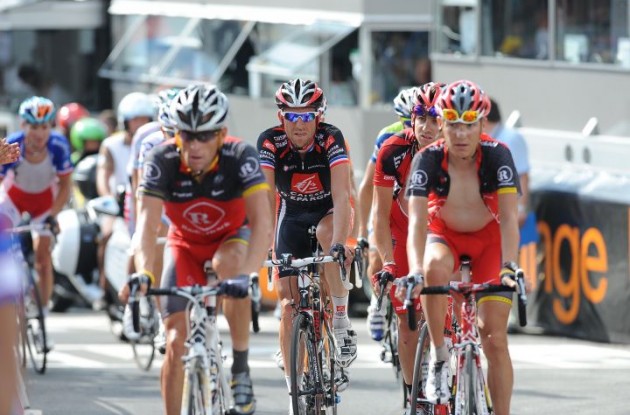Lance Armstrong Doping Investigators Travel to France
A USA investigation into allegations of doping in professional cycling has shifted its focus to France, and talks are scheduled with the French agency that has stored some of Lance Armstrong's urine samples.
A USA investigation into allegations of doping in professional cycling has shifted its focus to France, and talks are scheduled with the French agency that has stored some of Lance Armstrong's urine samples.
The agency plans to share everything it knows with the Americans, a French official said. The official spoke to AP on condition of anonymity because he was not authorized to publicly discuss the meeting with France's anti-doping agency, which he said is scheduled for this week.
The official said the American delegation is in France and he believes it is comprised of U.S. Food and Drug Administration Agent Jeff Novitzky, as well as U.S.A. federal prosecutor Doug Miller and U.S.A. Anti-Doping Agency CEO Travis Tygart.
Novitzky was booked Tuesday into a hotel in the south-central French city of Lyon, headquarters of the international police agency Interpol. Miller had also been booked in at the same hotel but then canceled the reservation.
Calls to Tygart's cell phone went unanswered Tuesday morning. In a recorded message, Tygart said he was out of the office on business.
The official told the AP that France's anti-doping agency would share everything it knows and has with U.S. investigators and is prepared to answer all questions.
The former head of the French agency, Pierre Bordry, previously promised to hand over Armstrong's samples from the 1999 Tour de France to Novitzky if the agent made an official request. Bordry announced his resignation this September after tussling with French authorities over the budget for the doping agency, known by its French initials AFLD.
The French official said he doesn't know whether U.S. investigators have formally requested the samples.
The French sports daily L'Equipe reported in 2005 that Armstrong's samples from 1999 contained traces of the banned performance-enhancer EPO.
An investigator mandated by cycling's international governing body, the UCI, later cleared Armstrong. The seven-time Tour de France winner has repeatedly denied allegations that he took performance-enhancing drugs.
U.S. federal prosecutors have been taking a look at cheating in cycling for months, aided by Novitzky, who played a key role in the BALCO scandal that implicated athletes such as Barry Bonds and Marion Jones and opened a window into doping methods.
Lance Armstrong became a more important figure in the probe this spring after disgraced Tour de France winner Floyd Landis, who was stripped of the 2006 title after failing a doping test, dropped long-standing denials and acknowledged he used performance-enhancing drugs. In doing so, he accused Armstrong and others of systematic drug use.








